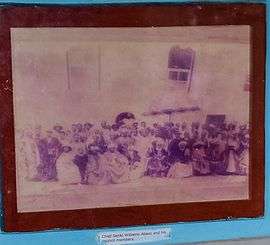Seriki Williams Abass
Chief Seriki Williams Abass (born Ifaremilekun Fagbemi) was a renowned slave merchant during the 19th century who became the paramount ruler of Badagry.[1] From the point of his coronation, he was known as Oba Seriki Williams Abass.

Life
Born Ifaremilekun Fagbemi in Joga-Orile, a town in Ilaro, Ogun State, Abass was captured as a slave by a Dahomean slave merchant called Abassa during one of the Dahomey–Egba clashes.[2] He was later sold to a certain Brazilian slave dealer called Williams who took Abass to Brazil as a domestic servant and taught him how to read and write in Dutch, English, Spanish and Portuguese languages.[3]
He returned to Nigeria on the condition of working with Mr. Williams as a slave trade business partner. He first settled at Ofin, Isale-Eko in the Colony of Lagos before he relocated to Badagry in the 1830s.[4] Believed to have married 128 wives and had 144 children, he succeeded in his slave-trade business while in Badagry and soon became the first person in the Egbado division of Badagry to own a lorry, the "Seriki Ford" he bought in 1919 to ply the Abeokuta–Aiyetoro Road. His wealth brought him respect and made him hold various top political and organizational positions including Seriki Musulumi of the whole of the western Yorubaland following his induction in 1897 by Chief lmam Yusuf;[5][6] before he was later appointed as the Paramount Ruler of Badagry and the Western District in 1913 through the Indirect Rule.[4]
Death
He died on 11 June 1919 and was buried in his Baracoon of 40 Slaves, the rooms in which his captured slaves were kept.[4]
Note
^a It was a norm that slaves bear the same name as their master
References
| Wikimedia Commons has media related to Seriki Williams Abass. |
- "An encounter with Anago at Seriki Abass Slave Museum - ATQ News". www.atqnews.com. Retrieved 11 June 2017 – via Nigerian Tribune.
- Lynn Harris (2016). Sea Ports and Sea Power: African Maritime Cultural Landscapes. SpringerBriefs in Underwater Archaeology. p. 18. ISBN 978-3-319-4698-50.
- Yusuf, Omotayo (19 July 2016). "Retro Series: How a slave became one of the greatest Lagosian and married 128 wives". Naij. Retrieved 11 June 2017.
- Tadaferua Ujorha (12 July 2016). "Seriki Williams Abass: 19th century slave merchant who married 128 wives". Daily Trust. Retrieved 11 June 2017.
- L. C. Dioka (2001). Lagos and Its Environs. First Academic. ISBN 978-978-34902-5-3.
- Siyan Oyeweso (1996). Journey from Epe: biography of S.L. Edu. West African Book Publishers.